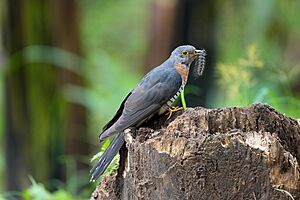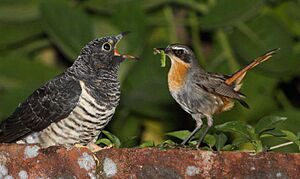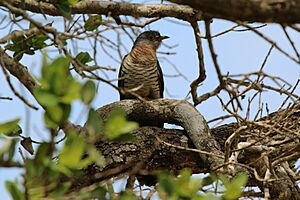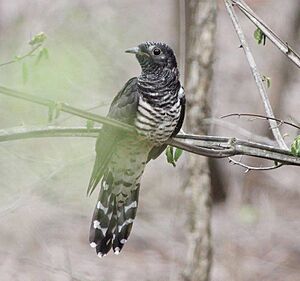Red-chested cuckoo facts for kids
Quick facts for kids Red-chested cuckoo |
|
|---|---|
 |
|
| Red-chested cuckoo at Kibale Forest National Park, Uganda | |
| Conservation status | |
| Scientific classification |
|
| Kingdom: | Animalia |
| Phylum: | Chordata |
| Class: | Aves |
| Order: | Cuculiformes |
| Family: | Cuculidae |
| Genus: | Cuculus |
| Species: |
C. solitarius
|
| Binomial name | |
| Cuculus solitarius Stephens, 1815
|
|
| Script error: The function "autoWithCaption" does not exist. | |
Script error: No such module "Check for conflicting parameters".
The red-chested cuckoo (Cuculus solitarius) is a special type of cuckoo bird. It belongs to the Cuculidae family. This medium-sized bird lives in Africa, mainly in the areas south of the Sahara Desert. In Afrikaans, people call it "Piet-my-vrou" because its call sounds like those words.
Contents
What Does It Look Like?
The red-chested cuckoo is a medium-sized bird. It grows to be about 31 centimeters (12 inches) long.
Male Cuckoos
Male cuckoos have dark grey feathers on their backs and wings. Their throats and the sides of their heads are light grey. Their dark grey tails have white tips. The chest is a reddish-brown color, sometimes with stripes. Their bellies are a creamy-white or light yellow color.
Female Cuckoos
Female cuckoos look a lot like the males. However, the reddish-brown color on their chests is not as bright. They also have different amounts of stripes on their chests.
Where Do They Live?
Red-chested cuckoos live in many countries across Africa. These include Angola, Botswana, Kenya, South Africa, and Zimbabwe. In Southern Africa, they are common visitors during breeding season. They are found almost everywhere there, except in very dry areas.
Preferred Homes
These cuckoos love to live in woodlands. You will usually see a red-chested cuckoo by itself. They do not often hang out with other cuckoos.
How Do They Behave?
Red-chested cuckoos are usually found alone. They are very noisy birds. They live in forests and on farms with trees.
What Do They Eat?
These birds eat many different things. Their diet includes insects like hairy caterpillars. They also eat spiders, centipedes, millipedes, slugs, and snails. Sometimes, they will eat small animals with backbones or berries.
Reproduction and Life Cycle

The red-chested cuckoo does not build its own nest. Instead, it is a brood parasite. This means it lays its eggs in the nests of other birds. About 15 different types of small birds can become hosts for cuckoo eggs.
The most common host birds are the Cape robin-chat (Cossypha caffra), the Cape wagtail (Motacilla capensis), and the white-throated robin-chat (Cossypha humeralis). The female cuckoo lays about 20 brown eggs each season. She places them in different nests. The host parents then raise the cuckoo chick, thinking it is their own baby.
 | George Robert Carruthers |
 | Patricia Bath |
 | Jan Ernst Matzeliger |
 | Alexander Miles |





